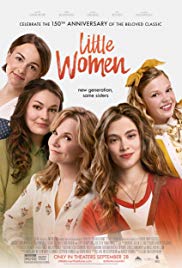
LITTLE WOMEN
US, 2018, 112 minutes, Colour.
Sarah Davenport, Leah Thompson, Allie Jennings, Melanie Stone, Elise Jones, Lucas, Gabreel, Taylor Murphy, Ian Bohen, Bart Johnson, Barar Heiner, Stuart Edge, Michael Flynn.
Directed by Clare Niederpruem.
This is a 21st-century adaptation of Louisa May Alcott’s classic novel. It is probably best for those who have not read the novel or seen previous film and television versions, of which there have been many, with Katherine Hepburn in the 1930s, MGM gloss in the 1940s, several miniseries, and Greta Gerwig’s 2019 version.
While there have been many updatings of classic literature – especially with Shakespeare, they have been of mixed quality. One of the strengths of the novel and previous film versions is the sensibility of the US at the time of the Civil War, 19th-century styles and manners, a family with decorum as well as energy, hopes and ambitions. The characters, the sisters and Marmee were very much of the time.
While some audiences may well enjoy this version, for those who remember the classics, the treatment seems too modern, at times too trite, a shift from 19th-century language which has some gravitas to contemporary American culture, slang, popular expressions, music, dates, dancing, making the March sisters much like any other teenagers and young adults.
While there is an atmosphere of niceness in the house, with Leah Thompson as a youngish and nice Marmee, father away on duty in war, there is nothing much to distinguish the sisters from any other family (with Paulist movies and other religious and moral groups financing the film, it might have been more, more substantial, a touch deeper…).
The character of Jo, always strong in the novel and in the various screen versions, is the exception here. She is played with some energy, at times over-energy and rage, by Sarah Davenport. While audiences might warm to her energy and ambition, she can be most exasperating to watch and listen to, losing her cool (her phrase “freaking out�, not Alcott’s), demanding and harsh on her sisters, dominating and demanding, especially Amy who (not necessarily unreasonably) takes revenge by tossing Joe’s journal into the fireplace. Her behaviour in the hospital when Beth is diagnosed with cancer (freaking out again) is reprehensible more than understandable.
The framework of the film is a focus on Jo in the present with a range of flashbacks to the life of the March girls and their interactions. The other three sisters are pleasant enough. And the young men are quite genial, Jo going into one of her tantrums when Meg wants to marry the neighbour. Jo is also writing novels, goes to theatrical performances, relies on the Professor for comment but goes on the defensive about her work – eventually finding that it is only by writing about her family that she will achieve success, and find love with the professor.
It seems rather harsh to say, but time would be more profitably spent with other film and television versions.